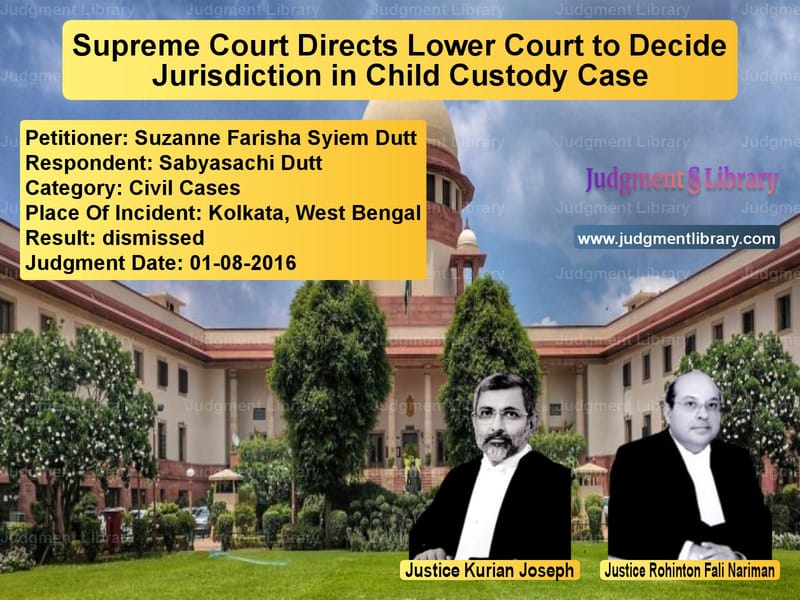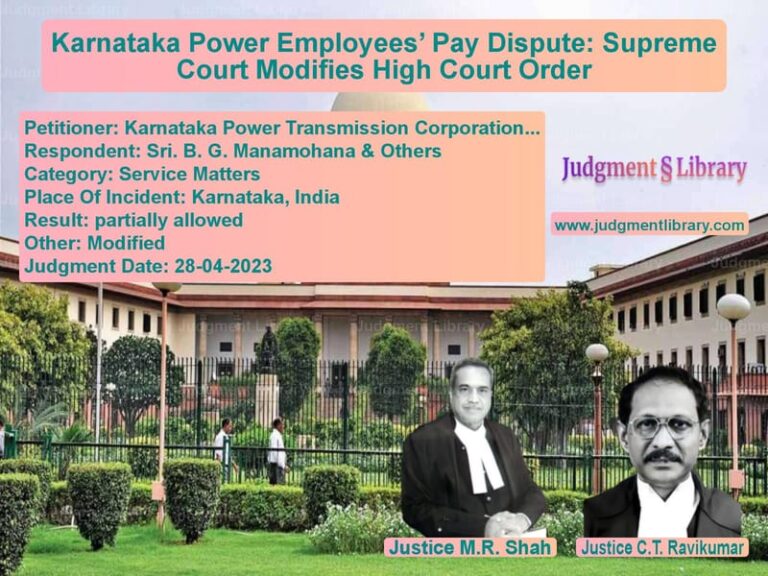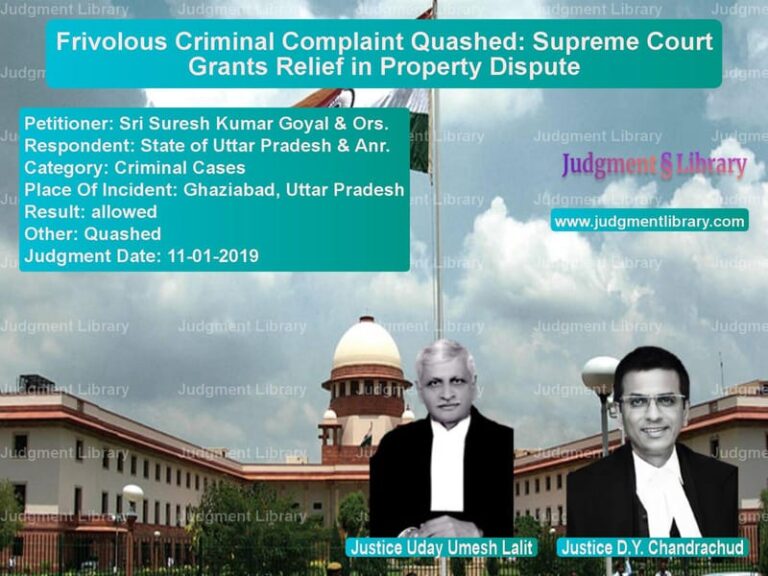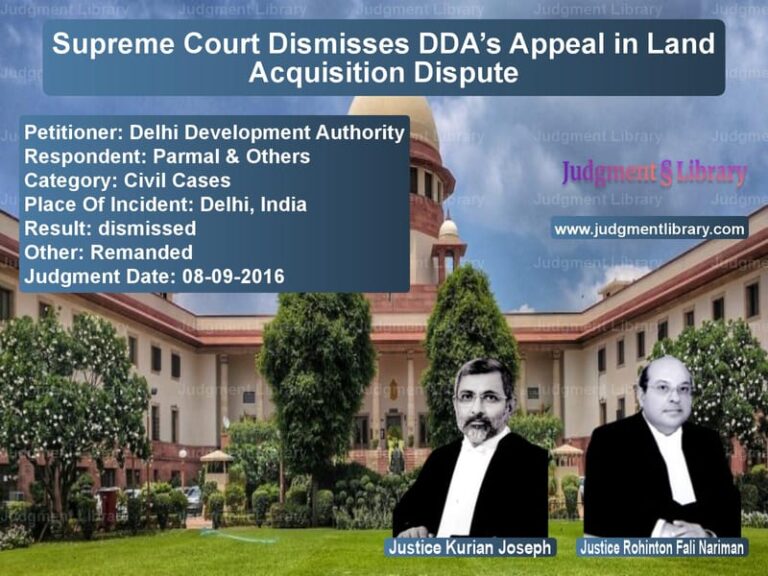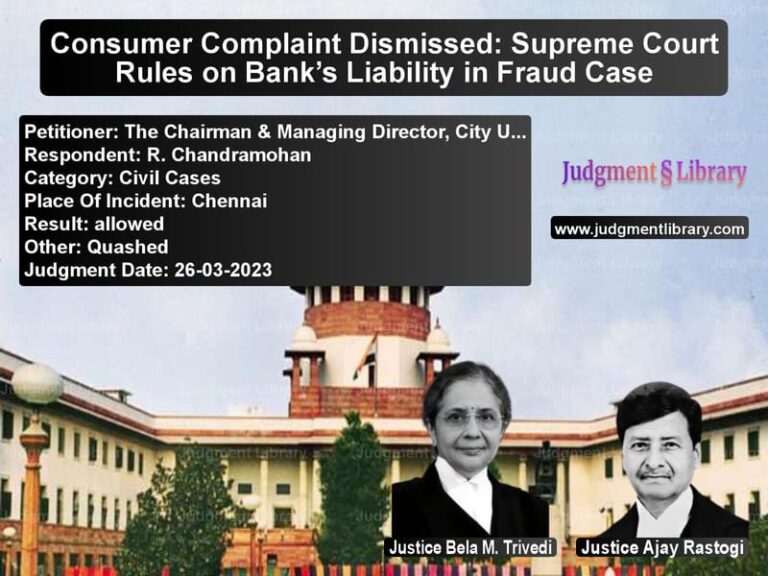Supreme Court Directs Lower Court to Decide Jurisdiction in Child Custody Case
The case of Suzanne Farisha Syiem Dutt v. Sabyasachi Dutt focused on the legal question of jurisdiction in a child custody dispute. The Supreme Court, in its judgment dated August 1, 2016, directed the District Judge, Alipore, South 24 Parganas, Kolkata, to determine whether it had the authority to hear the custody case under the Guardians and Wards Act, 1890.
The Court refrained from discussing factual and legal aspects of the matter but emphasized that the jurisdiction question had to be resolved before proceeding further with the custody issue. The judgment provided clear guidance on the importance of determining the correct forum for legal proceedings concerning child custody.
Background of the Case
The legal dispute arose between the appellant, Suzanne Farisha Syiem Dutt, and the respondent, Sabyasachi Dutt, regarding the custody of their minor child. The custody case was pending before the District Judge, Alipore, but a question emerged regarding whether the court had the proper jurisdiction to hear the matter under Section 25 of the Guardians and Wards Act, 1890.
The appellant raised a contention that jurisdiction should be considered in terms of Section 9 of the Guardians and Wards Act, which deals with the place where a minor ordinarily resides. This raised an important legal question that required adjudication before any custody decision could be made.
Legal Issues
The Supreme Court was required to examine:
- Whether the District Judge, Alipore, had jurisdiction under Section 25 of the Guardians and Wards Act to decide the custody dispute.
- Whether the appellant’s contention that jurisdiction should be determined under Section 9 was valid.
- What procedure should be followed in deciding the issue of jurisdiction before ruling on the custody matter.
Petitioner’s Arguments (Suzanne Farisha Syiem Dutt)
The petitioner argued:
- The court needed to determine jurisdiction before making any substantive decisions regarding child custody.
- Jurisdiction in custody matters should be decided based on where the child ordinarily resides, as per Section 9 of the Guardians and Wards Act.
- If the District Judge did not have jurisdiction, continuing the case would be legally improper.
Respondent’s Arguments (Sabyasachi Dutt)
The respondent countered:
- The court had already taken up the case, and the matter should proceed without further jurisdictional delays.
- The custody dispute should not be stalled due to procedural technicalities.
- The best interests of the child should be prioritized over procedural objections.
Supreme Court’s Observations and Ruling
1. The Court Must First Determine Jurisdiction
The Supreme Court made it clear:
“Since we propose to direct the District Judge to first go into the question of jurisdiction, we refrain from referring to the factual or legal aspects of the matter.”
This means the lower court was required to decide whether it had the authority to handle the case before making any decision on the merits of the custody dispute.
2. Section 9 Jurisdiction Must Be Examined
The Court explicitly stated:
“It is made clear that while taking the decision, as above, the contention raised by the appellant herein that the jurisdiction will have to be considered in terms of Section 9, will also be gone into.”
This meant that the appellant’s argument regarding jurisdiction based on the child’s residence had to be thoroughly examined before proceeding further.
3. Expedited Proceedings
The Supreme Court directed the District Judge to handle the jurisdiction issue without unnecessary delays:
“Since the next date of hearing before the District Judge is 06.08.2016, the District Judge is directed to finally hear and dispose of the application(s) within two weeks thereafter.”
This directive ensured that the jurisdiction issue would be resolved swiftly so that the custody proceedings could move forward.
Final Verdict
The Supreme Court disposed of the appeal with the following directives:
- The District Judge, Alipore, must first decide the question of jurisdiction before proceeding with the custody case.
- The issue of whether jurisdiction should be determined under Section 9 of the Guardians and Wards Act must be addressed.
- The matter must be resolved expeditiously, with a final decision on jurisdiction within two weeks after the next scheduled hearing.
Key Takeaways
- The Supreme Court emphasized the importance of determining jurisdiction before proceeding with legal matters.
- In custody disputes, jurisdiction is often tied to the place where the child ordinarily resides.
- The ruling ensured that the custody case would not face unnecessary delays due to procedural uncertainties.
Impact of the Judgment
The ruling set an important precedent for child custody cases in India. It reinforced that:
- Jurisdictional clarity is crucial before making substantive decisions in child custody matters.
- The best interests of the child should guide custody proceedings, but legal procedures must be followed.
- Court cases should not be prolonged unnecessarily due to technical objections, and expedited legal proceedings should be encouraged.
In conclusion, the Supreme Court’s decision in Suzanne Farisha Syiem Dutt v. Sabyasachi Dutt reaffirmed that courts must first establish jurisdiction before deciding on child custody matters. The ruling ensured that the legal process would be followed correctly while prioritizing the interests of the child involved.
Don’t miss out on the full details! Download the complete judgment in PDF format below and gain valuable insights instantly!
Download Judgment: Suzanne Farisha Syie vs Sabyasachi Dutt Supreme Court of India Judgment Dated 01-08-2016-1741878438843.pdf
Direct Downlaod Judgment: Direct downlaod this Judgment
See all petitions in Child Custody
See all petitions in Judgment by Kurian Joseph
See all petitions in Judgment by Rohinton Fali Nariman
See all petitions in dismissed
See all petitions in supreme court of India judgments August 2016
See all petitions in 2016 judgments
See all posts in Civil Cases Category
See all allowed petitions in Civil Cases Category
See all Dismissed petitions in Civil Cases Category
See all partially allowed petitions in Civil Cases Category

